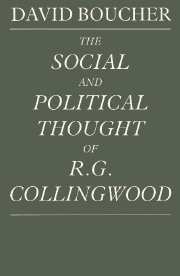Book contents
- Frontmatter
- Contents
- Preface
- 1 Collingwood in context
- 2 The New Leviathan in context
- 3 The two Leviathans and the criteria of rational action
- 4 The development of the European mind
- 5 Collingwood's liberal politics
- 6 The state and the body politic
- 7 The process of civilization
- 8 Conclusion: civilization and its enemies
- Notes
- Index
3 - The two Leviathans and the criteria of rational action
Published online by Cambridge University Press: 05 June 2012
- Frontmatter
- Contents
- Preface
- 1 Collingwood in context
- 2 The New Leviathan in context
- 3 The two Leviathans and the criteria of rational action
- 4 The development of the European mind
- 5 Collingwood's liberal politics
- 6 The state and the body politic
- 7 The process of civilization
- 8 Conclusion: civilization and its enemies
- Notes
- Index
Summary
Introduction
The last chapter showed how the long-term and short-term problems with which Collingwood concerned himself coalesced to inspire him to write The New Leviathan. In this chapter I will be principally concerned with two related questions. First, why did Collingwood take Hobbes as his exemplar? This question is not as naive as it may first appear. Indeed, there is no immediately apparent reason why Collingwood, given his affinities with the idealist tradition in philosophy, should have chosen Hobbes as the beneficiary of his lavish praise, and as the touchstone for his own ideas. The second of the questions, and by far the more important of the two, is this: What is the philosophical relation between the two Leviathans? In this respect, an arbitrary and capricious selection of issues for comparison simply will not do. Comparison has to be systematic, and what is compared has to be compatible and appropriate. For this reason, I invoke a triadic conception of the history of political thought, in order to place Hobbes and Collingwood in perspective. There are three aspects to a text which can bear fruitful comparison. In the first place we have the questions to which the philosopher addresses himself or herself. Second, there are the answers given, or conclusions reached. Third, and most important, are the reasons given for those conclusions.
- Type
- Chapter
- Information
- The Social and Political Thought of R. G. Collingwood , pp. 63 - 109Publisher: Cambridge University PressPrint publication year: 1989
- 1
- Cited by



